Years after Lennon's assassination, it would be revealed that the FBI had collected 281 pages of surveillance files on him. As the New York Times notes, "Critics of today's domestic surveillance object largely on privacy grounds. They have focused far less on how easily government surveillance can become an instrument for the people in power to try to hold on to power. 'The U.S. vs. John Lennon' " is the story not only of one man being harassed, but of a democracy being undermined."
Such government-directed harassment was nothing new.
The FBI has had a long history of persecuting, prosecuting and generally harassing activists, politicians, and cultural figures, most notably among the latter such celebrated names as folk singer Pete Seeger, painter Pablo Picasso, comic actor and filmmaker Charlie Chaplin, comedian Lenny Bruce and poet Allen Ginsberg. Among those most closely watched by the FBI was Martin Luther King Jr., a man labeled by the FBI as "the most dangerous and effective Negro leader in the country."
In Lennon's case, the ex-Beatle had learned early on that rock music could serve a political end by proclaiming a radical message. More importantly, Lennon saw that his music could mobilize the public and help to bring about change. However, while Lennon believed in the power of the people, he also understood the danger of a power-hungry government. "The trouble with government as it is, is that it doesn't represent the people," observed Lennon. "It controls them."
Unfortunately, Lennon's time as a troublemaker was short-lived.
Mark David Chapman was waiting in the shadows on Dec. 8, 1980, just as Lennon was returning to his New York apartment building.
As Lennon stepped outside the car to greet the fans congregating outside, Chapman called out, "Mr. Lennon!" Lennon turned and was met with a barrage of gunfire as Chapman emptied his .38-caliber pistol and pumped four hollow-point bullets into his back and left arm.
John Lennon was pronounced dead on arrival at the hospital.
Much like Martin Luther King Jr., John F. Kennedy, Malcolm X, Robert Kennedy and others who have died attempting to challenge the powers-that-be, Lennon had finally been "neutralized."
Still, you can't murder a movement with a bullet and a madman: Lennon's legacy lives on in his words, his music and his efforts to speak truth to power.
Unfortunately, Lennon's work to change the world for the better is far from done.
Peace remains out of reach. Activism and whistleblowers continue to be prosecuted for challenging the government's authority. Militarism is on the rise, all the while the governmental war machine continues to wreak havoc on innocent lives.
For those of us who joined with John Lennon to imagine a world of peace, it's getting harder to reconcile that dream with the reality of the American police state. And as I point out in my book Battlefield America: The War on the American People, those who do dare to speak up are labeled dissidents, troublemakers, terrorists, lunatics, or mentally ill and tagged for surveillance, censorship or, worse, involuntary detention.
As Lennon shared in a 1968 interview:
I think all our society is run by insane people for insane objectives" I think we're being run by maniacs for maniacal means. If anybody can put on paper what our government and the American government and the Russian" Chinese" what they are actually trying to do, and what they think they're doing, I'd be very pleased to know what they think they're doing. I think they're all insane. But I'm liable to be put away as insane for expressing that. That's what's insane about it."
So what's the answer?
(Note: You can view every article as one long page if you sign up as an Advocate Member, or higher).





